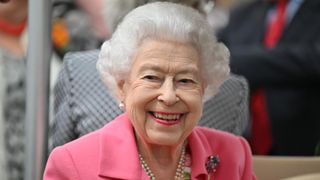Which British monarch has reigned the longest? (What about the shortest?)
After 1,200 years and 61 sovereigns, who are the record breakers?

Queen Elizabeth's Platinum Jubilee is set to be held from June 2 to June 5, 2022. This lavish four-day pageant, which includes horse racing and an Elton John concert, marks her 70th year on the throne.
But who is the longest-reigning British monarch? And whose reign was the shortest?
The British monarchy has been around for more than 1,200 years, spanning 37 generations. Over that time, 61 members of the royal family have occupied the throne, according to the online history magazine Historic UK (opens in new tab). These various rulers all trace their lineage back to England's first king, Athelstan — but the relationship is not always linear. "Sometimes we think of the royal succession unfolding smoothly, but that wasn't always the case," Carolyn Harris, a historian at the University of Toronto, told Live Science.
"A lot of the history of the monarchy is about war, who was literally the strongest," sociologist Laura Clancy of Lancaster University in the U.K., told Live Science. Countless battles have been fought over competing claims to the crown, including the infamous War of the Roses, which lasted from 1455 to 1485 and even inspired George R. R. Martin's "Game of Thrones."
Related: Who inherits the British throne?
Lady Jane Grey, who ruled England for just nine days in July 1553, is considered the shortest reigning monarch. Lady Jane was only a teenager when then-ruler king Edward VI died; she reportedly fainted upon learning that she was to take his place, according to Smithsonian Magazine (opens in new tab).
Lady Jane's ascent was swift and calculated. Her father-in-law, John Dudley, was determined to maintain power and keep Edward's half-sister, Mary Tudor, from taking the throne. So, he had Mary declared illegitimate on the grounds of her Catholic faith (and the fact that her mother, Catherine of Aragon, had fallen out of favor with King Henry VIII). Then he installed Jane in her place. "She was very much a pawn in these wider political battles," Harris said.

Unfortunately, Dudley's machinations backfired — shortly after Jane was deposed, he was beheaded. Lady Jane and her husband (John Dudley's son) were executed a few months later, according to History Today (opens in new tab).
This bloody line of ascension (mostly) simmered down in the mid-17th century with the establishment of the constitutional monarchy. Today, the line of succession is clearer and much less violent — which, in addition to modern medicine, means that modern monarchs have tended to live longer.
The British monarch with the longest reign is none other than Queen Elizabeth II herself. The now 96-year-old queen assumed the throne on June 2, 1953 in Britain's first-ever televised coronation. "In fact, she now has the third longest reign in recorded history," Harris said. The second-longest reign belongs to Thailand's King Bhumibol Adulyadej (Rama IX), who ruled for a little over 70 years, and coming in first is Louis XIV of France, with a staggering 72-year reign, according to the University of Kentucky's history department (opens in new tab).
The public role of the monarchy has continued to change since Elizabeth came to power, becoming less directly involved in enacting policy and taking on an increasingly philanthropic and "relatable" bent, as evidenced by the Royal Family's Instagram account (opens in new tab).
But Clancy and other scholars point out that the monarchy as an institution is deeply linked to a particular strain of British nationalism, one that flourishes in older and more traditional circles. "There's still overwhelming support for them to carry on," Clancy said. "And it's caught up in ideas about history and heritage and what Britain is."
However, young British people increasingly see the Crown as a relic of the past. In a 2021 Statista poll (opens in new tab) of nearly 5,000 British citizens, only 31% of respondents ages 18 to 24 supported the monarchy, compared with 81% of those over 65 who said the same. This marks a notable shift from previous years, according to data analytics group YouGov (opens in new tab). Some U.K. citizens even feel that it's time for the monarchy to end. "Prince Charles is known to want a 'slimmed down' royal family. That is insufficient. He should dispense with it altogether," wrote columnist Simon Jenkins in an article for the Guardian (opens in new tab).
In the meantime, though, the United Kingdom will celebrate the Queen's remarkable reign in elaborate fashion. Interested viewers can stream the festivities on ABC News or BBC One.
Originally published on Live Science.
Live Science newsletter
Stay up to date on the latest science news by signing up for our Essentials newsletter.

Joanna Thompson is a science journalist and runner based in New York. She holds a B.S. in Zoology and a B.A. in Creative Writing from North Carolina State University, as well as a Master's in Science Journalism from NYU's Science, Health and Environmental Reporting Program. Find more of her work in Scientific American, The Daily Beast, Atlas Obscura or Audubon Magazine.
Most Popular

By Harry Baker

By Ben Turner

By Jamie Carter